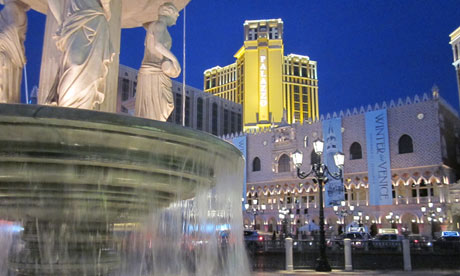
With a myriad of artificial lakes, fountains and swimming pools Las Vegas gives the impression the city has water to waste. Photograph: Leon Kaye
BLOG
Via The Guardian, an interesting look at Las Vegas’ struggle for water security and the symbolic foreshadowing it may provide of a growing global urban / rural tussle over water. As the article notes:

With a myriad of artificial lakes, fountains and swimming pools Las Vegas gives the impression the city has water to waste. Photograph: Leon Kaye
On World Water Day last month, Nevada’s state engineer approved the Southern Nevada Water Authority’s plans to claim around 84,000 acre feet of groundwater in two rural counties. White Pine and Lincoln counties have a combined population of 15,000, but are far richer in groundwater than parched metropolitan Las Vegas to the south. The region of 2 million people could run out of water in 20 years if alternative sources of water are not found.
This 21st century water conflict is an example of how thirsty cities and rural areas can clash over the rights to a precious resource. There is a distinct moral dilemma to this dispute over whether it is more critical to ensure the viability of large economies like Las Vegas, or to maintain the way of life of towns like Baker, a hamlet of 150 people where families have tended to the same land for generations.
Las Vegas was one of the cities hit hardest by the US foreclosure crisis, but there are signs that the economy is on the mend. New hotels and attractions keep opening, its convention business is competitive and the city is a haven for small and medium-sized businesses who relocate from high-tax states like California. Residents benefit from low housing prices, access to a spectacular outdoor lifestyle, and a libertarian political culture that is conducive to individuals who want to do their own thing. Information technology and health care industries are diversifying the local economy, providing more of a macroeconomic buffer from the dominant hospitality and gaming industries’ susceptibility to fluctuations in the business climate. Sustainable businesses are now taking root as well.
The region is becoming a test bed for clean energy technologies, including solar, wind and geothermal. Green building projects are also on the rise, including the CityCenter complex on the Las Vegas Strip. The local US Green Building Council boasts various LEED certified projects that emphasise huge achievements in water savings.
But if Las Vegas’ economy is to thrive in the future, the city must take a hard look at its water usage. An increase in sustainable building practices, with a focus on water stewardship, would be a start. While resorts do their part to conserve water, the myriad of artificial lakes, fountains and swimming pools give the impression that water is being wasted extravagantly. The resorts counter that the greatest usage of water on their properties is from air conditioning, a necessity in the summer to keep visitors comfortable in the searing summer heat that can soar over 40 degrees. The avoidance of a future water catastrophe will rely on cooperation between businesses, residents and local government.
So far cooperation between businesses and the Southern Nevada Water Authority (SNWA), responsible for meeting Las Vegas’ water needs, is off to a slow start. The SNWA offers businesses as much as £190,000 for replacing grass with more water-efficient landscaping. Rebates for the installation of water efficient technologies are also on the table. Coupons are available to residents for devices such as pool covers and rain sensors.
Despite this, during my recent visit to Las Vegas and stay at the Aria, part of the LEED gold certified CityCenter complex, it was hard to tell that Sin City was anywhere near a water crisis. Guests are prompted to do little but leave their towels on the rail if they are happy to reuse them. In fairness, for the hospitality sector, Las Vegas’ most important economic generator, the riddle is a tough one to solve.
How does an industry encourage its customers and employees to focus on water conservation when most visitors view travel for business or pleasure as an opportunity to behave differently than they would at home? If businesses cannot do more, why should residents? And if Las Vegas cannot find a way to drastically reduce its water consumption, is it smart for the city to drain water away from the rest of the state? After all, the ranchers and farmers in rural Nevada play a key role in feeding the city’s residents and visitors. The diversion of water from rural areas could replace one problem with another.